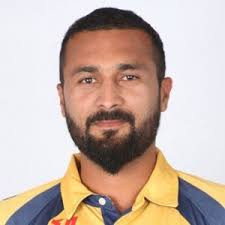Nicholas Verity Knight, commonly known as Nick Knight, is an English cricketer who has left an indelible mark on the sport during his playing career. Born on November 28, 1969, in Harrow, London, Knight quickly rose to prominence as a flamboyant left-handed opener for England’s one-day side.
Knight’s batting style was characterized by his ability to exploit fielding restrictions during the first 15 overs of the game. He was known for his aggressive stroke play, often slapping the ball over mid-on and carving it through the point. His attacking approach to batting made him a formidable force in limited-overs cricket and a nightmare for bowlers around the world.
However, Knight’s Test career was met with mixed results. He was known to be vulnerable outside the off stump and struggled against the straight, full-length delivery, often playing around his front pad and falling away to the off side. Despite these shortcomings, Knight had two memorable Test innings that showcased his potential. In 1996, he scored an impressive 113 against Pakistan at Headingley, followed by a close 96 in a draw against Zimbabwe at Bulawayo during the 1996-97 season.
Despite these early successes, Knight encountered a slump in form during England’s series in New Zealand in the winter of 1997-98, leading to his subsequent drop from the Test team. He made sporadic appearances for the national team, earning only five more Test caps, with four of them coming in 2000.
Knight’s exclusion from the World Cup team in 1999 was controversial, given his impressive performances in the VB Series leading up to the tournament. Many Australian cricket pundits were bewildered by his omission from the Test lineup. However, Knight made the difficult decision to retire from international one-day cricket following England’s disappointing World Cup campaign, allowing him to focus on his role as the captain of Warwickshire County Cricket Club.
Knight began his career at Essex County Cricket Club before transferring to Warwickshire in 1995. Known for his exceptional fielding skills, he excelled in various positions including third slip, gully, short midwicket, and cover sweeper. He was an outgoing and supportive teammate, often bringing a positive energy to the dressing room.
In 2006, Knight announced his retirement from professional cricket at the end of the year. Shortly after, he joined Sky Sports as a commentator, adding his insightful analysis and expert opinions to the broadcasting team. His charisma and extensive knowledge of the game made him a valuable addition to the world of cricket commentary.
Throughout his career, Knight proved to be a dynamic cricketer, leaving a lasting impact in limited-overs cricket and becoming a respected figure in the sport. Although his Test career may have been marked with inconsistency, Knight’s contributions to the game and his legacy as a talented left-handed batsman and fielder will forever be cherished by cricket enthusiasts worldwide.




